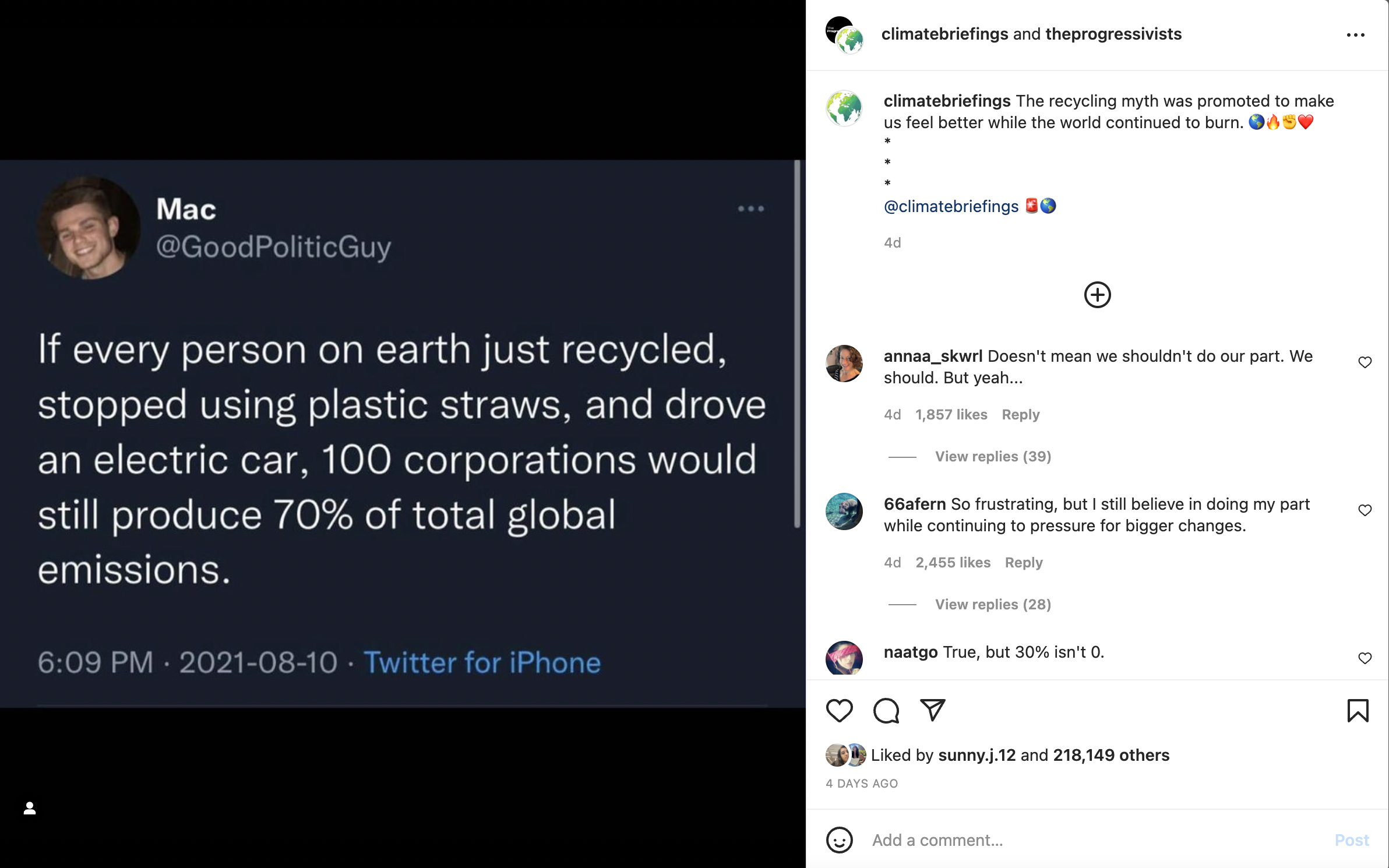
If you're on the climate doom side of the internet, you may have seen claims that blame 100 corporations for producing 70% of all the harmful emissions that are driving climate change, otherwise known as greenhouse gas emissions.
"If every person on earth just recycled, stopped using plastic straws, and drove an electric car, 100 corporations would still produce 70% of total global emissions," says a 2021 tweet from self-described socialist @GoodPoliticGuy that was shared on several other accounts.

These social media users aren't the first — and they probably won't be the last — to place the majority of the climate change burden on 100 companies.
The claim originates from a widely shared 2017 report from Climate Accountability Institute, a nonprofit advocacy group and the nonprofit charity Carbon Disclosure Project. Headlines from The Guardian, CNBC, Fortune and more claiming 100 companies are responsible for 71% of all emissions quickly followed.
But the report found that 71% of global industrial greenhouse gases can be attributed to 100 companies from 1988 to 2015. Keyword: industrial, which represents a part of total global emissions, but not all of them.
Total global emissions account for the greenhouse gases that are released from food production, burning gasoline, deforestation, oil production and more. The study focused on just the carbon dioxide and methane emissions from fossil fuel and cement production, which still make up a majority of global atmospheric greenhouse gases. It's wrong to suggest that consumers don't factor in global warming. Research shows the human activities driving climate change the most are from heating buildings, electricity use, agriculture, farming and fossil fuel-burning facilities and vehicles.
What the study consideredThe original study did not include emissions from land use, land use change or forestry, or from sources such as landfills, agriculture and farming. It also did not include data on indirect emissions, which come from purchased energy such as heating and electricity, citing concerns about double-counting emissions attributable to corporations.
The study relied on data collected by the Carbon Majors Database, which focuses on greenhouse gas emissions data from the largest company-related sources. In other words, The data derives from records of carbon dioxide and methane emissions relating to fossil fuel (oil, gas and coal) and cement producers dating back to 1854.
Richard Heede, the Climate Accountability Institute's director and the study’s co-author, leads the Carbon Majors Database. It contains operational and product-related carbon dioxide and methane emissions related to 100 fossil fuel producers, aka the "carbon majors," which include ExxonMobil, Shell, BP, Chevron, Peabody and BHP Billiton.
It’s difficult to discern how much total global emissions can be attributed to the top 100 polluting corporations, but there are ways to get a ballpark idea.
If you use the total global emissions calculated by the Climate Analysis Indicators Tool, an average of around 60% of global emissions can be traced back to those 100 companies from 1990 to 2015. But CAIT's research includes emissions from agriculture, land use and electricity that wasn't considered in the 2017 study.
If you use the total global emissions excluding land use and land-use change and forestry emissions from the Potsdam Institute for Climate Impact Research, then an average of around 63% of those emissions can be traced back to those 100 companies from 1988 to 2015. But Potsdam's research includes nitrous oxide and F-gases — fluorinated gases used in industrial applications — and considered only fossil fuel-related carbon dioxide and methane emissions.
Heede said in an email to PolitiFact that his recent research — not yet published — indicates that the emissions the study considered (carbon dioxide and methane from fossil fuels and cement production) account for 70.4% of total human-made emissions from 1988-2018. That could mean that about half of total global emissions can be traced back to those 100 companies. But the timelines are not equal, and it's not peer-reviewed.